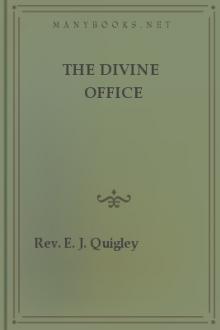The Divine Office by Edward J. Quigley (cool books to read .txt) 📕

- Author: Edward J. Quigley
- Performer: -
Book online «The Divine Office by Edward J. Quigley (cool books to read .txt) 📕». Author Edward J. Quigley
The origin of these commemorations was, that the Popes in removing the solemn celebrations of certain feasts of Apostles and Martyrs, which were formerly of precept, provided that their cultus should not be forgotten, and that their commemoration in the office should remind priests and the faithful of those servants of God, whom the Church wishes ever to honour. I have said the order given for commemoration in the Ordo should be followed; but not to follow this order does not exceed a venial sin. Even the deliberate omission of a commemoration in Lauds or Vespers is not a violation of a grave precept.
TITLE X.—THE TRANSLATION OF FEASTS.When several offices fall on the same day, only one office, the one of highest rank or most important, is said. The others are transferred or commemorated. The last section dealt with commemorations, and now we come to the difficult question of the translation of feasts. Title X. of the general rubrics must be read in connection with the Apostolic Constitution, Divino Afflatu (1911) and with the Abhinc duos Annos (1913).
Translation of a feast may mean the removal of a feast from an impeded day to a day which is free. Thus a feast of higher rank may fall on a feast day of a saint whose feast is of lower rank; the latter may then be transferred. Transference is either perpetual or accidental and temporary. The former applies to feasts which are always impeded by the meeting with a feast of higher rite on their fixed days. A feast which would fall on 6th January would suffer perpetual translation. This translation bears different names in rubrics, decrees and liturgical writings—translatio ad diem, fixam, translatio ad diem assignatam, mutatio, etc. Accidental translation means occasional transference, a transfer in one year and not in another.
Title II., section i, of the Divino Afflatu gives the characters of preferential rank which are to be considered in occurrence, concurrence or translation of feasts, Ritus altior, ratio primarii aut secundarii, Dignitas Personalis, solemnitas externa.
Although in the General Rubrics of the Breviary, the title De Festorum praestantia is not found, the four principles, (1)gradation of rite, (2)classification as a primary or secondary feast, (3)personal dignity, (4)external solemnity, are mentioned in the sixth section of Title X., De Translatione Festorum, and the degrees of personal dignity are added in the second section of Title XL, de commemorationibus. Before 1897 precedence, and hence transference, was settled first by the rank of the rite (Double major, etc.); then, too, between two feasts of the same rite, transference was settled by dignity and finally by solemnity. But in 1897 the Sacred Congregation of Rites indicated two further notes to be observed in the weighing of claims for transference, (1)the classification into primary and secondary feasts, (2)the distinction between fixed and movable feasts. This latter distinction—between fixed and movable feasts—has been suppressed by the new legislation and some changes made in the others.
I. Gradation of Feasts makes a distinction between doubles, semi-doubles and simples, and distinguishes the various kinds of doubles. The order of procedure will be—(1)Doubles of the first class, (2)doubles of the second class, (3)greater doubles, (4)doubles, (5)semi-doubles, (6)simples. But as the section shows (Tit. II., sec. i) this is subject to the privileges of certain Sundays, ferias, and octave days or even days within an octave. And hence, an ordinary Sunday, though! only a semi-double, will take precedence of a double; and an octave day, though only a double, takes precedence of a greater double.
II. Classification as a primary or a secondary feast. Tables of classification are to be found in the prefatory part of the new Breviary, under the headings Tres Tabellae. They give a revised list of feasts with their rank and rites. Some feasts are reduced from primary to secondary rank (e.g., Feast of the Dolours); and the tables give a new division of primary and secondary doubles and semi-doubles.
III. Thirdly, the order of precedence among feasts will be determined by the dignity of the person who is the special object of the office that is to be recited. Hence, in the order set down in General Rubrics (Title XI, De Concurrentia officii, sec. 2) all feasts of our Lord, other things being equal, take precedence of the feasts of our Lady. And then, in order, come the festivals of the angels, of St. John the Baptist, of St. Joseph, of the Apostles and other saints. Amongst the saints who are honoured as martyrs, confessors or virgins there is no precedence as to personal dignity.
IV. Lastly, there is the note of "external solemnity," which may give precedence to one or two feasts, which are equal in the above-mentioned matters—i.e., in Gradation I., Classification II., Precedence III. But the main point is that only doubles of first and second class have the right, as a rule, of transference. Transference is now rather rare.
"From these rules it will be seen that in cases of concurrence, occurrence, perpetual transfer or translation, precedence between two feasts will first be decided by gradation of rite, a double of the first class being preferred to one of the second, and so on. If the feasts are of equal rank recourse must be had to the second test, the distinction between primary and secondary feasts. If both happen to be primary, or both are secondary, then precedence will be granted to the feast which has the greater personal dignity. And if both feasts should have the same dignity, then the fact of external solemnity would confer precedence" (The New Psalter and its Uses, p. 79). For practical help, a look at the first of the Duae Tabellae is a guide to find out which office is to be said, if more than one feast occur on the same day.
Before discussing new offices it may be well to remember that votive offices of all kinds, including the votive offices conceded by the decree of July, 1883, are abolished. These offices were drastic innovations, introduced to get rid of the very long psalm arrangement of the ferial office. The new distribution of the psalms got rid of the onus, and votive offices are no longer given in the Breviary.
TITLE XL—CONCURRENCE.Concurrence is the conjunction of two offices which succeed each other, so that the question arises to which of the two are the Vespers of the day to be assigned. The origin of this conjunction of feasts was by some old writers traced to the Mosaic law in which the festivals, began in the evening, and they quote "from evening until evening you shall celebrate your sabbaths" (Leviticus, xxii. 32). The effect of concurrence may be that the whole vespers may belong to the feast of the day or may be said entirely from, the feast of the following day; or it may be that the psalms and antiphons belong to the preceding festival and the rest of the office be from the succeeding feast. The General Rubrics, Title XI, must be read now in conjunction with Titles IV., V., and VI. of the Additiones et Variationes ad norman Bullae "Divino Afflatu". The rules for concurrence are given in Table III. of the Tres Tabellae inserted in the new Breviary (S.C.R., 23 January, 1912). These tables supersede the tables given in the old editions of the Breviary. The first of these two tables shows which office is to be said, if more than one feast occur on the same day, whether perpetually or accidentally. The second table is a guide to concurrence—i.e., whether the first vespers of the following feast is to be said entirely without reference to the preceding feast, or if second vespers of the preceding feast is to be said entire, without reference to the following; or, again, first vespers of the following with commemoration of the preceding, or second vespers of the preceding with commemoration of the following, or vespers of the more noble feast with commemoration of the other—any of these may be the liturgical order to follow, and the Tabella makes things clear.
The "tables" are to be used thus:—Opening the Breviary at the I Tabella, "Si occurrat eodem die," first find the number marked in that square in which the two feasts in question meet, and then read the direction printed, in column on same page to left-hand side, bearing the same number. For example: the question is about the occurrence of a Sunday of the first class and a Double of the first class. Double of the first class stands first word of page, and Sunday of first class will be found in column beneath the rows of figures. Now the square in which straight lines drawn from double of first class and Sunday of first class meet bears the number 6, and reference to number 6 in column of directions found on same page gives the rule, "Officium de 2, Translatio de I," that is, the office must be of the Sunday of first class and the double of the first class must be transferred according to the rubrics. When in these brief directive notes, (1-8), mention is made of the "first or the preceding," the reference is made to feast or office printed in the upper part of the Table, e.g., Double of first class. Reference to "the second" or "following" refers to feast printed in the lower section of the Table. Where O stands in a square in the Tabella it signifies that there can be no occurrence or concurrence between feasts whose "lines" meet in that square. These two tables are very ingeniously arranged. The lists, given in the Breviary following these tables, give the lists of greater Sundays and Ferias, privileged vigils, doubles of first and second class and greater doubles, and tell whether feasts are primary or secondary.
TITLE XII.—THE ARRANGEMENT OF THE OFFICE ACCORDING TO THE RUBRICS GIVEN ABOVE.If any one wish from the rubrics given in the Breviary to arrange the office, he can see in the calendar and in the tables of movable feasts which office he is to say on the following day. And when he has found out the feast he determines, from the rules given, the vespers and the other hours.
If the office be the office of an excepted feast, the whole office is said from the feast as it is in the Proper or Common of saints; but the psalms of Lauds and the hours are taken from the Sunday psalms, as they stand in the new Psaltery, At Prime the psalm Deus in nomine is said in place of Confitemini. Compline is said from the Sunday psalms. If the office be the ordinary non-excepted office it is recited according to the rule laid down in the new rubrics. Tit. I., n. 5,:—
"Ad matut, invit. Hymnus, Lectiones II. et III. nocturni ac responsoria 2 et 3 nocturnorum propria vel de communi; antiphonae vero, psalmi et versus trium nocturnorum necnon Lestiones I. Nocturni cum suis Responsoriis de feria occurrente…."
"Ad Laudes et ad Vesperas ant. cum Psalm. de Feria; Capit. Hym. Vers. et Antiph. ad Benedictus vel ad magnificat cum oratione aut in Proprio aut de Communi ad Horas minores et Complet. aut cum Psalm semper dicitur de occurrente Feria. Ad Primam pro Lectione breve legitur capit. Nonae ex Proprio, vel de Communi. Ad Tertiam, sextam et Nonam, capit. Respons. breve et orat. pariter sumuntur vel ex Proprio vel de Communi."
(Matins and the other hours are treated of in another section.)
PART II. RULES FROM MORAL AND ASCETIC THEOLOGY FOR THE RECITATION OF THE BREVIARY. MORAL THEOLOGY GIVES THE RULES AND LAWS, WHICH MUST BE FOLLOWED FOR THE VALID AND LICIT RECITATION OF THE HOURS. ASCETIC THEOLOGY EXPLAINS THE MEANS, WHICH ARE TO BE USED IN THEIR FERVENT RECITATION. CHAPTER I. MORAL AND ASCETIC THEOLOGY.Q. Who are bound to recite the Divine Office?
R. 1. Religious, that is, all those who have made
Religious Profession, in the Canonical
sense, and who are bound to Choir recitation
(Canon 610, Juris Canonici).
2. Clerics in Holy Orders (Canon 135, Codex).
3. Beneficed Clergy.
Who are Beneficed Clergy?
Beneficed Clergy are those who hold a Canonically erected benefice. Canon 1409 of the Codex Juris Canonici defines an ecclesiastical benefice to be a "Juridical entity





Comments (0)